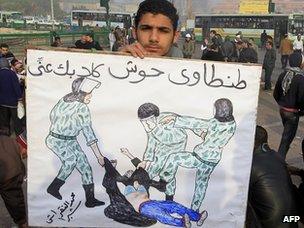Egypt unrest: Cairo clashes reveal deep divisions
- Published

Pictures of a woman being attacked by soldiers shocked many in Egypt
In socially conservative Egypt, the image is particularly shocking - a woman protester knocked to the ground with her clothes ripped to show her bra.
Amateur video shot in Tahrir Square in central Cairo shows a soldier in riot gear stamping on her chest before another stoops to cover up her bare flesh.
Other footage - also widely circulated using social media - shows an army officer firing a pistol as he runs at demonstrators, although it is not clear whether he is using live ammunition.
Inevitably, questions have been asked about the brutality used by the security forces to break up what was - until Friday - a relatively peaceful sit-in against military rule on the edge of Tahrir Square.
There was international condemnation from the likes of US Secretary of State Hillary Clinton and UN Secretary General Ban Ki-moon.
At a hastily convened news conference, the ruling Supreme Council of the Armed Forces was on the defensive.
It expressed regret for the experiences of the woman activist who was partly undressed, and promised an investigation.
But it then went on to suggest that people were abusing their democratic right to protest to cause "chaos".
It said that in recent days it had only sought to defend the nation's institutions from attack - including the cabinet building and parliament.
'Methodical plot'
Pictures were shown of youths ransacking public property.
"What are we supposed to do when protesters break the law? Should we invite people from abroad to govern our nation?" asked Maj-Gen Adel Emara.
"There is a methodical and prepared plot to topple the state, but Egypt will not fall."
In a dramatic moment during the conference, Maj-Gen Emara suggested that a plot to burn down parliament had just been uncovered and that a huge crowd was standing by in Tahrir Square to carry out the plan.
Footage has been released of Egyptian troops ripping off a woman's clothing and beating her during demonstrations in Tahrir Square
Actually, several hundred protesters had gathered at a nearby mosque for the funeral of an activist killed overnight.
The competing narratives of events that have unfolded since Friday only highlight the deepening divisions that exist in Egyptian society.
Activists genuinely fear that the army is trying to keep control of the levers of power and are continuing to demand an immediate transfer to civilian rule.
Yet the military is counting on the support of the wider public. It believes they are satisfied with the fact that parliamentary elections are proceeding relatively smoothly.
The second round, which took place in nine governorates last week, produced an official turnout of 67%.
Many Egyptians are worried that the spiral of violence could spin out of control and they look to the armed services as a stabilising force.
Some I have spoken to also buy the propaganda and conspiracy theories that protesters are taking money from former lawmakers and businessmen.
They readily accept the way they were labelled - "counter-revolutionaries" - by new Prime Minister Kamal al-Ganzuri.
As Ibrahim al-Fayed returned to Tahrir Square for the latest demonstrations, he remained resolute but admitted the growing danger of losing the PR battle.
"People were definitely moved by the pictures they saw after the weekend but the problem is they are being told by the government that they should not have any sympathy for us," he said.
"The minute they announce the final election results, they won't want to see a single protester on the streets."